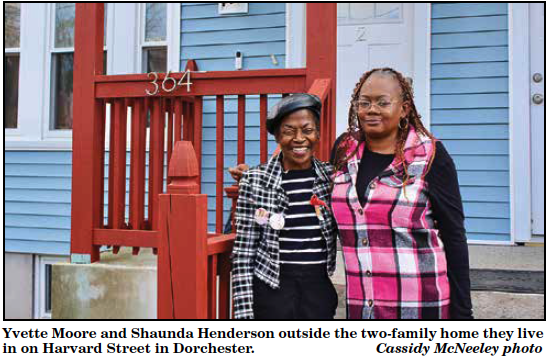November 14, 2024

A city program aimed at preserving affordable housing stock marked a significant milestone on Oct. 24 at a home on Harvard Street in Dorchester, one of 1,000 across the city that has been stabilized for tenants through Boston’s Acquisition Opportunity Program (AOP).
Two women who rent apartments in the two-family house – Yvette Moore and Shaunda Henderson – say they might have left Boston altogether if not for the city-subsidized loan program that helps non-profits acquire properties and keep rents reasonably priced.
The city program protects Boston’s affordable housing stock and combats gentrification by working with non-profit organizations to acquire units. Sheila Dillon, the city’s longtime chief of Housing, said that the original goal set under the Walsh administration was to acquire 1,000 units by 2030.
“We didn’t think we would reach this goal so quickly,” Dillon said at the gathering on Harvard Street. “Because of the Wu administration’s commitment to this program, we have met this goal five years early. Since [Mayor Wu] has come into office we have acquired and stabilized and permanently preserved 400 restricted units getting us over that 1000 unit mark,” Dillon added.
The Mayor’s Office of Housing offers loans to help responsible investor-owners buy occupied, multi-family rental properties. These acquisitions provide stability for families and neighborhoods by converting at risk-rental properties into permanent affordable housing.
“We all know we have a very, very strong rental market,” Dillon said. “It’s causing us a lot of pain. There are many investors looking to purchase buildings in Boston and these purchases often have very sad endings with residents being displaced by unreasonable rent increases or condo conversions.”
This was almost the case for Moore and Henderson, who live in the 2,618-square- foot multi-family home on Harvard Street. Henderson moved to the home three years ago after her previous home was badly damaged in a fire.
“I had a house fire that made us homeless,” said Henderson. “Coming here, I thought this was going to be it. I wasn’t even here a year when the landlord said he was putting the house up.”
Overcome with worry, Henderson turned to her upstairs neighbor for support.
“The landlord was selling the house and my neighbor Shaundra, she became scared,” said Moore. “I told her, ‘We’re going to make this happen. Don’t move, don’t sign nothing.’”
Moore, who has lived at the property for five years, reached out to City Life/ Vida Urbana (CLVU,) a grassroots organization that helps tenants stay in their homes.
“City Life was an important part of the project of how we acquired this building in the community,” said co-executive director at City Life, Mike Leyba. “Yvette and Shaundra came to CLVU because they were facing eviction and our work helps them fight the eviction and partner with a nonprofit to acquire the building.”
Leyba helped Moore and Henderson form a tenant association and work with the Boston Neighborhood Community Land Trust to purchase the property.
“Every neighborhood, every zip code of Boston is facing rent increases,” Leyba said. Dorchester, Roxbury, Mattapan, Hyde Park, East Boston, this is where our people live. This is where communities of color live and working families live. We need to preserve the housing we have in addition to building new housing.”
Meredith Levy, executive director of Boston Neighborhood Community Land Trust, hailed the AOP initiative as “a program that is effective and works. In the last three years we have been able to buy five buildings through AOP and that means 17 more families are able to live in our properties and be a part of our land trust. That’s really valuable.
She added: “So many people are getting displaced all the time. We are at a crisis level. Our work as a land trust is to make sure we can keep folks in their homes and keep the neighborhoods thriving the way they should be. We are committed to affordable housing not just for a few years but forever.”
When Levy and her team purchased Moore and Henderson’s home, there was plenty of renovation to be done. In addition to improving plumbing, electricity, and ventilation, Boston Neighborhood Community Land Trust also had to address health issues that included mold.
“I was in the hospital this year and was put into an induced coma,” Moore told the Reporter. “We didn’t know at the time that the mold was there.” Added Henderson: “I was smelling it and warning her. She has asthma.”
Thanks to the program and the work of their partners, Moore and Henderson now have a home that doesn’t just look better, but is also safe to live in.
“Me and my neighbor and our families can live without having to worry. All that is over,” Moore said. “We’re able to stay here the rest of our lives.”


